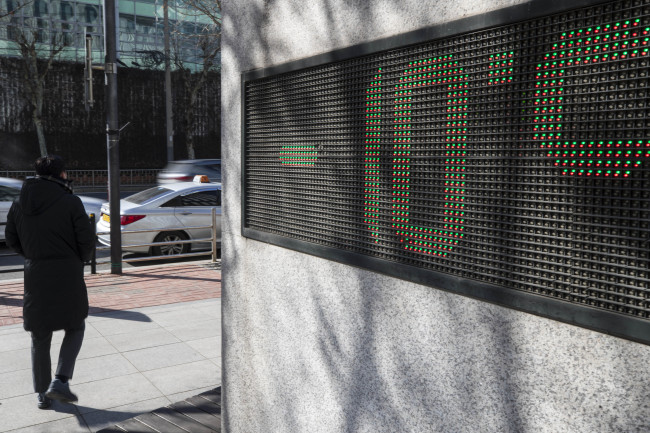South Korea woke up to the coldest day of winter so far as morning temperatures Wednesday plunged to minus 17 degrees Celsius in Seoul, minus 7.7 C in Busan and minus 10.3 C in Daegu, just a day after the weather agency issued cold wave warnings for most parts of the country.

A cold wave warning is issued when the temperature remains below minus 15 degrees for two or more days, according to the Korean Meteorological Administration.
Due to the frigid conditions, the Korea Power Exchange issued a demand response order -- the third this year -- to local companies to reduce electricity use between 9 a.m. and 11:30 a.m. As of early Wednesday evening, the country’s power use had soared to 85 million kilowatts with increasing demand for heating. Some 1,700 companies saved about 2.7 million kW of electricity under the order, according to the Korea Power Exchange.
Wednesday’s wind chill temperatures plummeted to minus 23 C in Seoul in the morning and some parts of the country, while daytime highs hovered from minus 12 C to zero C.
The arctic cold weather is caused by a large area of high pressure from northern China, the weather agency said, which is expected to ease starting Sunday.
The weather agency upgraded its cold wave advisory that was issued in most parts of the country -- including Seoul and its surrounding metropolitan areas, Chungcheong provinces, Gangwon Province and parts of Sejong City -- to a cold wave warning earlier Tuesday.
Up to 5 centimeters of light snow accompanied the frigid weather in the west coast, Jeju and Chungcheong provinces.
Weather forecasters said the frigid conditions would continue throughout this week, warning of icy roads and sidewalks and possible damage to crops.
By Bak Se-hwan (sh@heraldcorp.com)








![[Graphic News] More Koreans say they plan long-distance trips this year](http://res.heraldm.com/phpwas/restmb_idxmake.php?idx=644&simg=/content/image/2024/04/17/20240417050828_0.gif&u=)
![[KH Explains] Hyundai's full hybrid edge to pay off amid slow transition to pure EVs](http://res.heraldm.com/phpwas/restmb_idxmake.php?idx=644&simg=/content/image/2024/04/18/20240418050645_0.jpg&u=20240419100350)





![[From the Scene] Monks, Buddhists hail return of remains of Buddhas](http://res.heraldm.com/phpwas/restmb_idxmake.php?idx=652&simg=/content/image/2024/04/19/20240419050617_0.jpg&u=20240419175937)

![[KH Explains] Hyundai's full hybrid edge to pay off amid slow transition to pure EVs](http://res.heraldm.com/phpwas/restmb_idxmake.php?idx=652&simg=/content/image/2024/04/18/20240418050645_0.jpg&u=20240419100350)

![[Today’s K-pop] Illit drops debut single remix](http://res.heraldm.com/phpwas/restmb_idxmake.php?idx=642&simg=/content/image/2024/04/19/20240419050612_0.jpg&u=)